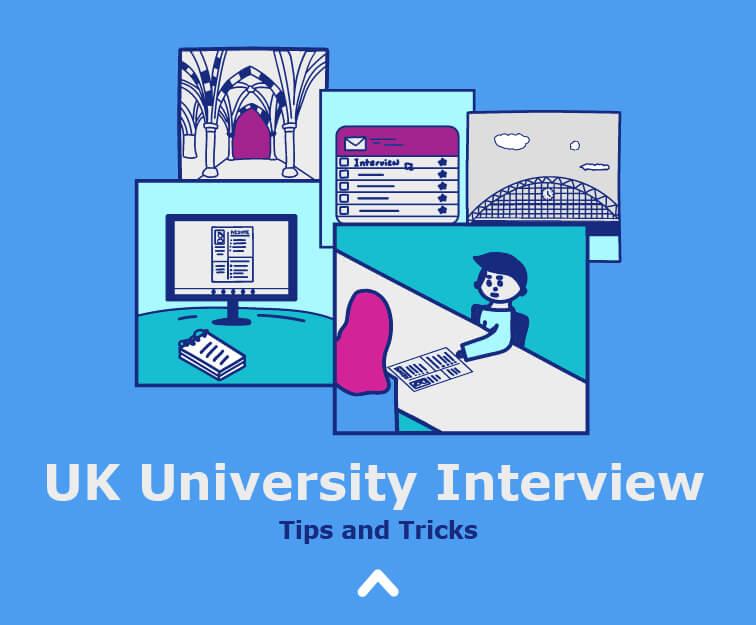How to Cope with Interview Anxiety
Tips and Advice
University Life
Careers
4 mins read
Share

Updated at: 25 November, 2025
Published at: 30 September, 2020
By Radwa Ragab
How to Cope with Interview Anxiety
Tips and Advice
University Life
Careers
4 mins read

Updated at: 25 November, 2025
Published at: 30 September, 2020
By Radwa Ragab
Share
Are you preparing for December university interviews at a UK university like the University of Oxford or the University of Cambridge? You must be very excited thinking about joining the university of your dreams. Still, interviews can be stressful, so how can you avoid interview stress and anxiety? Most importantly, you should remember that they invited you to the interview for a reason; they liked you enough to invite you to the next state of the application.
What Makes You Nervous When You Have An Interview?
We all know that stress is a natural psychological response. By preparing well, you can stay confident in the interview. But, there are some specific reasons that cause this kind of nervousness and anxiety. This includes thinking you’ll mess up, failing in previous interviews, underestimating your abilities and skills to be qualified, and knowing that all the eyes are on you! Therefore, here are some essential tips that will help you prepare for your interview and pass it.
1. Be prepared
A super important step you need for any interview is to have the contact number of the interview organizer. In case anything unexpected happens, like a delay because of the weather, you have to let them know that you will be late. This will help avoid any negative first impressions by being late.
2. Communicate With the Interviewer
Prepare some questions to ask during and after the interview to show how much you are interested in the school and the course. Have a solid and clear idea of why you want to join their school, and how it will affect your career the way you want. Do some research to show your dedication and seriousness about your dreams. Avoid saying things like “ I want to join this university because of your reputation, good academics, nice campus, etc.” Rather, give them really specific and detailed reasons; maybe you’ve read a book by a certain professor in the university, and you wish to learn from him/her. The more specific questions you have about the university and program, the better chance you will have to get accepted.
Moreover, your body language and eye contact are key elements to consider throughout the whole interview. Maintain a good posture, speak clearly, don’t mumble, take your time to breathe, and take a sip of water if you need it.
3. Read Through Your Personal Statement
It’s common at any interview that you’ll be asked first about what’s written in your statement. So be honest and write your personal statement out of your knowledge and experience.
4. Prepare Well
1- Make sure you are familiar with the route to campus. Use Google Maps to calculate the distance between your accommodation and the university. Ensure the weather is good and if not, calculate the delay expected on the road in advance. Familiarise yourself with private cars and taxis apps if there are any in the city; this way, you are always ready for any emergency.
2- Dress formally and stick to the dress code if they told you one.
3- Have a good understanding of the modules and curriculum of the program you are applying to.
4- Get a pen and notepad for anything you may want to take note of during the interview
5- Always use positive language. They need someone who is enthusiastic, optimistic, and willing to learn. And talking in a positive way is a good sign for what they’re looking for.
5. Use the PEN Framework
At the interview, they are not evaluating how you wrote your personal statement or how correctly you answer all the questions they ask. They seek a confident student who can come and say “This is what I will do with my life.” when they ask “Tell us about yourself?” They ask this question to get to know you more, and an easy way to answer this question is PEN Framework.
P stands for Passion. Show them how you are passionate about the major. What do you want to do after you graduate if you have any plans in mind or even a project you are working on at the moment.
E is for the Experience. Talk about any related social service or extracurricular activities that you have done. Mention everything you did that is related to the major you are applying to, even if it’s a book you read. They will be impressed with how you surround yourself with anything that might enhance and improve yourself in the field. N stands for Next. Here is your chance to prove how creative and determined you are . It’s fine if you don’t have a plan for the future yet. Show them how hard you work in your chosen major to achieve continuous progress.
6. Train Your Brain
The questions are designed to be progressively harder. So if you get a question that you don’t know, try to go around. Work out through what you know that might be close to the core of the question. Think before you speak and reflect on what you say out loud since showing them your thought process is important.
As we mentioned before, knowing what’s going on around you is important as you might get a question like: Why is your major important to the world? Try to connect your major and what you want to achieve out of it to current world events.
In the end, thank the interviewers for their time. Once you are done, have a drink and take some notes for yourself upon your performance at the interview. This will help you think about what areas you need to develop further. You can also contact the university after a while for feedback. Whether it’s good or bad, this is vital for shaping your technique for future interviews.
Tips and Advice
University Life
Careers
By Radwa Ragab
Share
Tips and Advice
University Life
Careers
Updated at:
Published at:
By Radwa Ragab
Share


